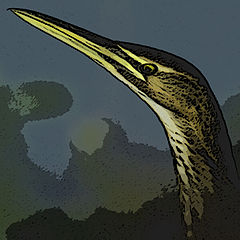- Matuku-tangotango
-
In Māori mythology, Matuku-tangotango (Matuku) is an ogre who kills Wahieroa the son of Tāwhaki.[1] In some versions, Matuku lives in a cave called Putawarenuku. Rātā, the son of Wahieroa, sets off to avenge his murdered father, and arrives at last at Matuku's village. He hears from Matuku's servant that at the new moon his master can be killed at the pool where he washes his face and hair.[2] When the new moon has come, Rātā waits until the ogre comes out of his cave and is leaning over with his head in the pool. He grabs him by the hair and kills him. Rātā then sets off to rescue his father's bones from the Ponaturi. A South Island version names the islands where Matuku lives as Puorunuku and Puororangi and also states that Rātā nooses Matuku as he comes out of his lair to perform certain rituals (Tregear 1891:232, 399-400).
- The expedition into the realm of Matuku-tangotango conducted by Wahie-roa was for the sake of plumes of kake-rangi (kohi-rangi) birds, and was led by Manu-korihi (with Whakarau as 2nd-in-command); it was obstructed by Ngaupara, the lieutenant of Matuku-tangotango.[3]
- "Wahieroa was murdered in his sleep by his own slave".[4]
- Having gained the sought-for plumes, the expedition returned safely through the country of the Ngati-Toko-rakau, who were governed by Ko-waiwai.[5]
- After Rata had arrived in Haohao-nui (the palace of Matuku-tangotango), located in the fortress Awa-rua, Rata's disguised voice was mistaken by Matuku-tangotango for that of Matuku-tangotango's own brother Tahuaroa.[6]
- The neck of Mataku-tangotango was caught in 3 nooses and was strangled.[7]
Names and epithets
- Matuku (bittern)
- Matuku-tangotango ('tangotango' perhaps means 'dark as night', or 'ominous')
- Matuku-takotako (South Island dialect).
Notes
- ^ Matuku means 'bittern' in Māori. Related words in other Polynesian languages refer to birds of the heron family. These birds tend to swallow their food whole, in large gulps. This may give some appreciation of Matuku-tangotango's greedy, devouring nature
- ^ If Matuku-tangotango is imagined as bittern-like, he can be imagined as washing his plumage at the pool, because the Māori word for 'hair' or 'feathers' is the same: 'huruhuru'
- ^ Elsdon Best (tr.) : "Wahieroa and Rata", pp. 1-5. In :- JOURNAL OF THE POLYNESIAN SOCIETY, vol. 31 (1922), pp. 1-28[1]
- ^ Elsdon Best (tr.) : "Wahieroa and Rata", p. 6. In :- JOURNAL OF THE POLYNESIAN SOCIETY, vol. 31 (1922), pp. 1-28[2]
- ^ Elsdon Best (tr.) : "Wahieroa and Rata", p. 7. In :- JOURNAL OF THE POLYNESIAN SOCIETY, vol. 31 (1922), pp. 1-28[3]
- ^ Elsdon Best (tr.) : "Wahieroa and Rata", p. 12. In :- JOURNAL OF THE POLYNESIAN SOCIETY, vol. 31 (1922), pp. 1-28[4]
- ^ Elsdon Best (tr.) : "Wahieroa and Rata", pp. 13. In :- JOURNAL OF THE POLYNESIAN SOCIETY, vol. 31 (1922), pp. 1-28[5]
References
- E.R. Tregear, Maori-Polynesian Comparative Dictionary (Lyon and Blair: Lambton Quay), 1891.
- John White : The Ancient History of the Maori. Wellington, 1887. vol. 1, pp. 68-69, 90; 78 [These references are supplied (along with the gist of their contents) in :- Martha Beckwith : Hawaiian Mythology. 1940. p. 260, fns. 11-12]
Categories:- Māori mythology
- Oceania mythology stubs
- Māori stubs
Wikimedia Foundation. 2010.

